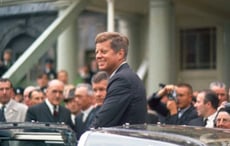Back in 1972 Emmett O’Connell, a Bronx–born businessman resident in Ireland, wrote a pamphlet entitled “Ireland and the EEC -- The Consequences of Monetary Union.”
It is an extraordinary document that has the power of prophecy as we look at the economic crash landing in Ireland today.
The European Union was the EEC then and Ireland was considering joining the European mainstream. The first few paragraphs of O’Connell’s pamphlet read:
“For the second time in modern history Ireland is debating whether or not to join an economic union. In 1800 full equality within the United Kingdom was offered in return for the sacrifice of Grattan’s parliament (which was the Irish Parliament at the time.) It was expected that free access to British and Imperial markets would bring such prosperity to Ireland that any nostalgia for Ireland would disappear.
“That economic union brought tragedy to Ireland, not prosperity, and the longing for self-determination did not fade away. In a few months the people of the 26 county republic will be faced with a similar offer, full equality within the EEC in return for the sacrifice of economic and possibly, political sovereignty.
“This time the parliament and outward trappings of a state remains -- the better to fool us with.”
Those were surely prophetic words given recent events, and O’Connell, still hale and hearty and as committed as ever, was in my New York office last week to expound further on them.
“I always knew the day would come,” he says now. “We bought a pig in a poke, that was always going to turn around and bite us.”
Here is more of what he wrote: “If the countries of the Common Market succeed in reaching agreement on final parity… of their currencies (i.e., what later became the euro) no Common Market country will be able to help itself through currency manipulation (i.e., devaluing ) in the event of disruption.”
Incredibly this is exactly what has happened. Ireland desperately needs to devalue its currency, raise it s interest rates and start making the country competitive again, but it cannot because it is locked into the euro.
Again from O’Connell’s writings: “If the planned monetary union succeeds, member countries will automatically surrender authority over their monetary and fiscal polices.”
The arrival of the International Monetary Fund (IMF) and EU officials to Dublin last month brought that prophecy home to roost in no uncertain fashion.
He also wrote: ‘The Central Bank of Ireland will not be permitted to increase the amount of credit available to Irish citizens to permit them to increase trade.”
This is exactly what has happened, as all fiscal policy and dole outs now come from Europe, apart from the Irish pension funds, which have been depleted by the IMF/EU bailout.
O’Connell completed his analysis by writing: “Why not work for a world where government and economics are under genuine human control because the size of such units are small, sensible and human scale.”
Is there anyone alive in Ireland who would disagree with that commentary now?
Back then O’Connell was looked on as a crank, as someone who was trying to turn back the tide. These days his boat has come in.
What would he do now? “Leave the euro. Several countries such as Britain and Sweden are not part of it but are still part of the European Union.”
Who will bet he’s wrong this time?
Not me.
It is an extraordinary document that has the power of prophecy as we look at the economic crash landing in Ireland today.
The European Union was the EEC then and Ireland was considering joining the European mainstream. The first few paragraphs of O’Connell’s pamphlet read:
“For the second time in modern history Ireland is debating whether or not to join an economic union. In 1800 full equality within the United Kingdom was offered in return for the sacrifice of Grattan’s parliament (which was the Irish Parliament at the time.) It was expected that free access to British and Imperial markets would bring such prosperity to Ireland that any nostalgia for Ireland would disappear.
“That economic union brought tragedy to Ireland, not prosperity, and the longing for self-determination did not fade away. In a few months the people of the 26 county republic will be faced with a similar offer, full equality within the EEC in return for the sacrifice of economic and possibly, political sovereignty.
“This time the parliament and outward trappings of a state remains -- the better to fool us with.”
Those were surely prophetic words given recent events, and O’Connell, still hale and hearty and as committed as ever, was in my New York office last week to expound further on them.
“I always knew the day would come,” he says now. “We bought a pig in a poke, that was always going to turn around and bite us.”
Here is more of what he wrote: “If the countries of the Common Market succeed in reaching agreement on final parity… of their currencies (i.e., what later became the euro) no Common Market country will be able to help itself through currency manipulation (i.e., devaluing ) in the event of disruption.”
Incredibly this is exactly what has happened. Ireland desperately needs to devalue its currency, raise it s interest rates and start making the country competitive again, but it cannot because it is locked into the euro.
Again from O’Connell’s writings: “If the planned monetary union succeeds, member countries will automatically surrender authority over their monetary and fiscal polices.”
The arrival of the International Monetary Fund (IMF) and EU officials to Dublin last month brought that prophecy home to roost in no uncertain fashion.
He also wrote: ‘The Central Bank of Ireland will not be permitted to increase the amount of credit available to Irish citizens to permit them to increase trade.”
This is exactly what has happened, as all fiscal policy and dole outs now come from Europe, apart from the Irish pension funds, which have been depleted by the IMF/EU bailout.
O’Connell completed his analysis by writing: “Why not work for a world where government and economics are under genuine human control because the size of such units are small, sensible and human scale.”
Is there anyone alive in Ireland who would disagree with that commentary now?
Back then O’Connell was looked on as a crank, as someone who was trying to turn back the tide. These days his boat has come in.
What would he do now? “Leave the euro. Several countries such as Britain and Sweden are not part of it but are still part of the European Union.”
Who will bet he’s wrong this time?
Not me.




Comments